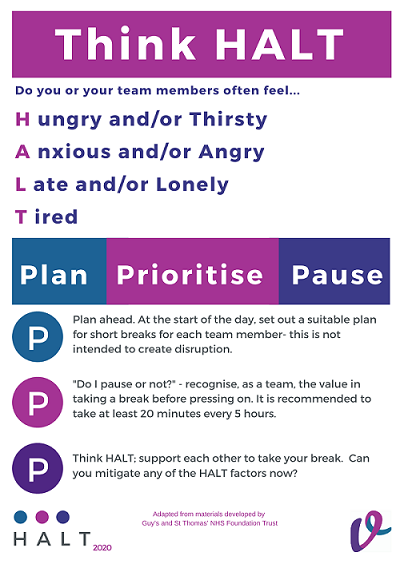Standing up for the veterinary profession
08 Aug 2024
03 Feb 2021 | Cat Auden
At a time of inordinate stress for veterinary teams, Cat Auden from VetLed introduces the VetLed HALT campaign, a free package of materials used to recognise physical and mental needs of your team and support in how to meet them.

In early 2020, Covid-19 was a little-known problem, somewhere far away. We could never have imagined the impact it was going to have on us as individuals, as a profession, and globally. At the time, we were working on re-releasing our updated HALT campaign which originally ran in 2018. The timing would be more important than we could have known.
Our vision at VetLed is to inspire, create and encourage positive veterinary culture for our people, our patients and our profession. Championing safe, efficient and effective veterinary care, the HALT campaign provides practices with a package of free materials to support you in supporting your teams during this difficult time and beyond. The stressors on our veterinary teams have probably never been greater, and so it has never been more important to actively choose to look after our people. But we also know that the busier we are, the harder it can be to prioritise finding time to pause and really consider how we are doing, never mind working out what to do about it.
We want the simple HALT message to reach everyone within the profession, and to ensure that all practices and organisations have equal access to the support materials.
HALT is an acronym that has been used in numerous contexts for decades. It serves as a simple tool that places the spotlight on some of the physical and mental elements commonly affecting wellbeing and performance:
H ungry and/or Thirsty
A nxious and/or Angry
L ate and/or Lonely
T ired
Using the HALT mnemonic effects just a brief pause which can help to recognise how we are feeling. Whilst there are dozens of other aspects that are of course of relevance, those seen within HALT have been used for decades as a self-care tool by many groups and organisations. They act as a good summary for areas that can leave us vulnerable.
Research by the Medical Protection Society (MPS) on doctors under investigation following complaints against them, has highlighted the importance of the HALT indicators…
“…be mindful of how human factors can affect your performance. Remember the HALT mnemonic; where possible anticipate these, and take action to mitigate their impact.”[1]
We know that working for long hours without taking breaks isn’t healthy - neither for individuals, their colleagues nor their patients. It doesn’t make anyone more productive either. Particularly during the current COVID crisis, we are even more likely to be suffering one of the HALT factors, so it is increasingly important to recognise this and mitigate against them where possible. As vets ourselves, we fully recognise this isn’t always possible, but with the HALT reminder to check in with yourself and your team, there is the opportunity to make little adjustments when we can.
Even a short break offers a crucial opportunity to identify aspects of our wellbeing, however it requires commitment from the entire team to ensure breaks are taken fairly, and without risk to patient safety.
As part of the campaign we communicate simple steps on how to manage aspects within HALT but above all, we advocate the importance of a culture in which veterinary professionals feel ‘safe’ to take a break (see our blog on Workplace Psychological Safety).
We encourage practices to start planning ahead at the beginning of the shift for short breaks and prioritising taking those breaks when they come. We have simplified this to the “Three Ps” – Plan, Prioritise and Pause.
Whilst aspects within HALT might seem obvious, the reality of the human condition is that we don’t always do what we know we should, particularly with the added strains of practice in lockdown. Often the instinctive need to achieve the current goal beats the logical intention to stay hydrated, to take a break or to take time to address sources of stress. Combine this with social pressure such as team members (especially leaders/managers) not taking their breaks, and it’s inevitable that ‘pushing on regardless’ then becomes the cultural norm – or is even applauded.
“Unless critically ill patients require your immediate attention, our patients are always better served by clinicians who have had appropriate periods of rest during their shifts.”
Dr Mike Farquhar, Consultant in Sleep Medicine at Guys & St Thomas' NHS Foundation Trust
At Vetled, we believe that HALT has the potential to significantly impact the wellbeing of professionals in the veterinary industry, and as a consequence improve care - for the animals we treat, and also for our fellow veterinary professionals.
With lockdowns, childcare stresses and concern over potential illness, our teams are giving their all, and more. If there was ever a time to prioritise supporting our team, now is that time.
The HALT 2020 Campaign Support Pack includes:
- How to HALT – a general guide to HALT
- HALT 2020 poster
- HALT 2020 Start Guide – support for the HALT champion in your practice to effectively help your team to think and act on HALT needs!
- HALT 2020 presentation including notes to support you to launch HALT in your practice – idea for a team meeting or lunch and learn.
The HALT 2020 materials are intended to provide you with everything you need to promote HALT in a safe, applicable and effective way in your individual practice. Access more information and the free HALT materials on the VetLed website.
[1] https://www.medicalprotection.org/uk/articles/skipping-over-the-details
Get tailored news in your inbox and online, plus access to our journals, resources and support services, join the BVA.
Join Us Today